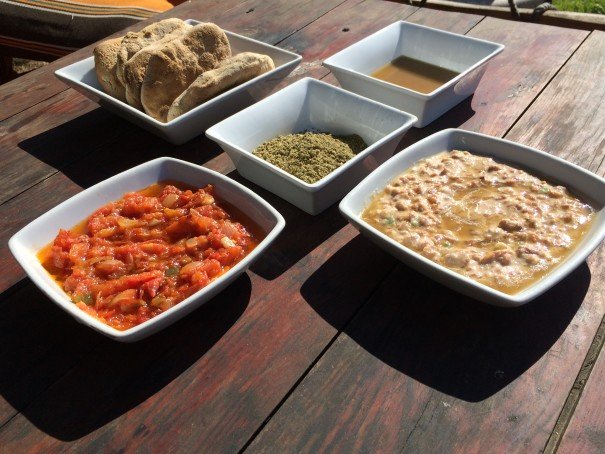
Eating Local in an Occupied Land

Eating Local in an Occupied Land
Zeit Wa Za’atar in Beit Jala
The topographical nature of Palestine and Israel is fourfold: the western coastal plains, the central foothills, the eastern rugged mountains, and the arid Jordan valley. Hosh Yasmin, an organic farm located in the Makrour Valley, sits at the heart of the rugged mountains, overlooking groves of olive trees and Jerusalem to its north and Beit Jala and Bethlehem to its south.
I travel to Hosh Yasmin from Jerusalem on a white and blue bus that mainly serves local Palestinians and tourists headed to Bethlehem. After a fifteen-minute ride and a pass through a checkpoint, the bus stops in front of an Israeli army base bordering the Palestinian town of Beit Jala. I get off the bus and walk in the opposite direction down a narrow road, just wide enough to fit a single car. A wooden sign and pyramid-like structure appear in the distance, marking the entrance to the farm.
When I arrive at the farm, Mazen, the owner, kindly greets me in Arabic, “ahlan wa sahlan.” He surveys the different outdoor seating options and directs me to a table just above his grove of olive trees. He then promptly brings me a cup of tea made from sage, mint, thyme, lavender, and other herbs grown on the farm. I sip my tea and take in the breathtaking landscape around me. I feel the hilltop winds blow past my face and barely hear the cars passing along the road in the valley below.
Gradually Mazen brings out each breakfast dish, which he has carefully prepared with organic ingredients from his farm and the surrounding villages. He first brings arguably the two most famous Palestinian staples, zeit wa za’atar, olive oil and za’atar. Eating utensils are discouraged here, so I dip homemade wheat bread into the thick and opaque olive oil—unique to Beit Jala because of its white soil—and then the za’atar, a heavenly combination.
He then brings foul, a pasty fava bean dip native to Palestine and other parts of the Middle East. Unlike the traditional dark-brown foul, Mazen has created a light-brown foul, easier on the stomach and filled with flavor. He explains that he soaks the fava beans for three days, boils and smashes them, and then infuses them with local herbs, green pepper, lemon, and tahini, giving it a lighter color. I sample the foul and its different flavors coalesce into one sharp and rich taste of deliciousness.
Next Mazen brings qalayet bandoura, an oily tomato dish common among Palestinian villagers. He prepares this dish by first sautéing garlic, onion, and green pepper and then adding chopped tomatoes and spices. For good measure, he douses the dish in olive oil. The aromatic smell of garlic wafts through the air. Breakfast at Hosh Yasmin is an excursion into the culinary roots of the Palestinian society: both the great food and the tradition of exceptional hospitality.